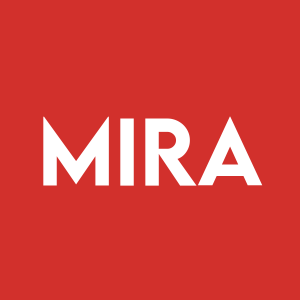MIRA Pharmaceuticals Announces Ketamir-2 Outperforms Current FDA-Approved Neuropathic Pain Treatments, Gabapentin and Pregabalin, in Preclinical Study
Rhea-AI Summary
MIRA Pharmaceuticals (NASDAQ:MIRA) announces that its novel oral ketamine analog, Ketamir-2, outperforms FDA-approved neuropathic pain treatments Gabapentin and Pregabalin in preclinical studies. Key findings show Ketamir-2 provided up to 112% more effective results than Pregabalin and 70% greater relief than Gabapentin at higher doses by Day 22 in female rats.
Ketamir-2 offers advantages over current treatments, including being non-habit forming and potentially avoiding sedation and cognitive impairment. MIRA is preparing to submit an Investigational New Drug (IND) application by year-end, with Phase 1 clinical trials scheduled for Q1 2025 and Phase 2 trials in Q4 2025. The company is also exploring Ketamir-2's potential for PTSD treatment and pursuing government grants to accelerate development.
Positive
- Ketamir-2 showed 112% more effective results than Pregabalin and 70% greater relief than Gabapentin in preclinical studies
- Ketamir-2 is non-habit forming, unlike current treatments like Pregabalin
- MIRA is on track to submit an IND application by the end of 2024
- Phase 1 clinical trials for Ketamir-2 are scheduled to begin in Q1 2025
- The company is exploring Ketamir-2's potential for PTSD treatment, expanding its market opportunities
- MIRA is pursuing government grants to accelerate development and delivery of Ketamir-2
Negative
- Ketamir-2 is still in preclinical stage, with human trials yet to begin
- The drug's efficacy and safety in humans remain unproven
- Regulatory approval process could be lengthy and uncertain
News Market Reaction 1 Alert
On the day this news was published, MIRA declined 4.55%, reflecting a moderate negative market reaction.
Data tracked by StockTitan Argus on the day of publication.
MIAMI, FL / ACCESSWIRE / October 21, 2024 / MIRA Pharmaceuticals, Inc. (NASDAQ:MIRA), a leading pre-clinical-stage pharmaceutical development company, is excited to announce that its novel oral ketamine analog, Ketamir-2, has shown greater pain relief compared to FDA-approved treatments Gabapentin (Neurontin) and Pregabalin (Lyrica). Ketamir-2, a non-opioid, offers tremendous promise for patients seeking better solutions for neuropathic pain without the habit-forming risks or debilitating side effects associated with existing medications.
Key Study Findings:
The latest preclinical study, conducted using a nerve ligation-induced neuropathy model in female rats, demonstrated that low doses of oral Ketamir-2 provided significant pain relief by Day 15. By Day 22, Ketamir-2 achieved up to
Limitations of Current FDA-Approved Treatments and the Need for Innovation:
Neuropathic pain is a growing global health concern, with increasing prevalence linked to conditions like diabetes, chemotherapy-induced nerve damage, and post-herpetic neuralgia. The demand for effective pain management is reflected in the large and expanding market for treatments like Gabapentin (Neurontin) and Pregabalin (Lyrica). Gabapentin is expected to reach
Despite their widespread use, these drugs come with significant side effects that limit their long-term effectiveness:
Gabapentin: Long-term use can cause drowsiness, dizziness, cognitive impairment, and weight gain, along with the potential for misuse and withdrawal upon discontinuation (source).
Pregabalin: As a controlled substance, Pregabalin carries a risk of dependence. Patients frequently report weight gain, edema, and cognitive issues, and withdrawal symptoms are common when the drug is stopped (source).
Ketamir-2: A Safer, More Effective Alternative:
Ketamir-2 offers several key advantages over current treatments:
Non-Habit Forming: Unlike Pregabalin, Ketamir-2 carries no known risk of dependence, making it safer for long-term use.
Superior Pain Relief: The preclinical data shows that Ketamir-2 offers better efficacy than Pregabalin and better efficacy than Gabapentin.
Fewer Cognitive Side Effects: With the potential to avoid sedation and cognitive impairment, Ketamir-2 offers an improved quality of life compared to currently available treatments.
Expanding Ketamir-2's Potential Beyond Neuropathic Pain:
MIRA is actively preparing to launch preclinical trials for post-traumatic stress disorder (PTSD), recognizing the urgent need for non-addictive treatments for PTSD. The growing mental health crisis highlights the need for effective alternatives to existing PTSD medications, and Ketamir-2 has the potential to fill that gap.
The company is also actively pursuing government grants for PTSD and other indications, capitalizing on the increased public focus and funding initiatives aimed at mental health treatment. These grants could help accelerate the development and delivery of Ketamir-2 to patients suffering from PTSD, depression, and other neuropsychiatric conditions.
Next Steps:
MIRA is on track to submit an Investigational New Drug (IND) application for Ketamir-2 by the end of this year and is currently preparing for Phase 1 clinical trials scheduled to begin in the first quarter of 2025. The company aims to start Phase 2 trials in the last quarter of 2025, allowing for the first signs of human efficacy by the end of that year.
As part of these preparations, MIRA is pursuing scientific publications to share progress and insights with the broader medical community. Ongoing preclinical studies are evaluating Ketamir-2's impact on chemotherapy-induced neuropathy, a condition that, if proven effective, could qualify the drug for FDA breakthrough designation, potentially shortening the regulatory timeline. The company is also conducting further studies for diabetic neuropathy, expanding the therapeutic potential of Ketamir-2.
"We are fully committed to bringing this breakthrough drug to patients as quickly as possible while backing everything we do with strong science," said Erez Aminov, Chairman and CEO of MIRA Pharmaceuticals. "Ketamir-2 has the potential not only to address neuropathic pain but also to make a significant impact in the treatment of PTSD and depression. Our goal is to ensure that those who need it most have access to this innovative treatment as soon as possible."
"The very encouraging preclinical results obtained to date are truly remarkable, and we are excited about the strong promise of Ketamir-2 as we smoothly advance it through development," added Dr. Angel, Chief Scientific Advisor at MIRA Pharmaceuticals.
About MIRA Pharmaceuticals, Inc
MIRA Pharmaceuticals, Inc. (NASDAQ:MIRA) is a pre-clinical-stage pharmaceutical development company with two neuroscience programs targeting a broad range of neurologic and neuropsychiatric disorders. MIRA holds the exclusive U.S., Canadian, and Mexican rights for Ketamir-2, a novel, patent-pending oral ketamine analog under investigation to treat neuropathic pain (NP), treatment-resistant depression (TRD), major depressive disorder with suicidal ideation (MDD-SI), and post-traumatic stress disorder (PTSD).
MIRA's novel oral pharmaceutical marijuana analog, MIRA-55, is currently under investigation for treating adult patients suffering from anxiety and cognitive decline, often associated with early-stage dementia. If approved by the FDA, MIRA-55 could mark a significant advancement in addressing various neuropsychiatric, inflammatory, and neurologic diseases and disorders.
The U.S. Drug Enforcement Administration's scientific review concluded that both Ketamir-2 and MIRA-55 would not be considered controlled substances or listed chemicals under the Controlled Substances Act and its governing regulations.
Additional information about MIRA Pharmaceuticals is available at www.mirapharmaceuticals.com.
Cautionary Note Regarding Forward-Looking Statements
This press release and the statements of MIRA Pharmaceuticals' (or the "Company") management related thereto contain "forward-looking statements," which are statements other than historical facts made pursuant to the safe harbor provisions of Section 27A of the Securities Act of 1933, as amended, and Section 21E of the Securities Exchange Act of 1934, as amended. These statements may be identified by words such as "aims," "anticipates," "believes," "could," "estimates," "expects," "forecasts," "goal," "intends," "may," "plans," "possible," "potential," "seeks," "will," and variations of these words or similar expressions that are intended to identify forward-looking statements. Any statements in this press release that are not historical facts may be deemed forward-looking. These forward-looking statements include, without limitation, statements regarding the anticipated benefits of the study results described herein as well as the timing for the Company's other preclinical studies and the filing of an IND for Ketamir-2. Any forward-looking statements in this press release are based on the Company's current expectations, estimates, and projections only as of the date of this release and are subject to a number of risks and uncertainties (many of which are beyond the Company's control) that could cause actual results to differ materially and adversely from those set forth in or implied by such forward-looking statements. These and other risks concerning the Company's programs and operations are described in additional detail in the Annual Report on Form 10-K for the year ended December 31, 2023, and other SEC filings, which are on file with the SEC at www.sec.gov and the Company's website at http://www.mirapharmaceuticals.com/investors/sec-filings. The Company explicitly disclaims any obligation to update any forward-looking statements except to the extent required by law.
Contact Information
Helga Moya
info@mirapharma.com
(786) 432-9792
SOURCE: Mira Pharmaceuticals, Inc.
View the original press release on accesswire.com







